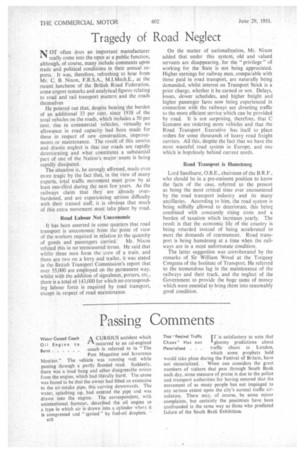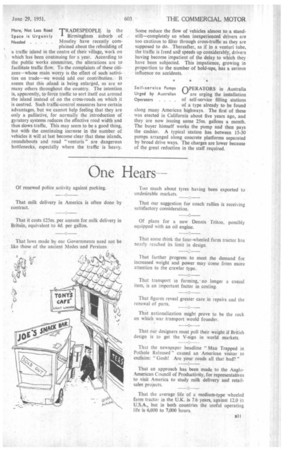Passing Comments
Page 44

Page 45

If you've noticed an error in this article please click here to report it so we can fix it.
Water Caused Coach A CURIOUS accident which Oil Engine to I-1 occurred to an oil-engined
Burst coach is referred to in "The Post Magazine and Insurance Monitor." The vehicle was running well while passing through a partly flooded road. Suddenly, there was a loud bang and other disagreeable noises from the engine, which had literally burst. The cause was found to be that the owner had fitted an extension to the air-intake pipe, this curving downwards. The water, splashing up, had entered the pipe and was drawn into the engine. The correspondent, with unintentional humour, described the oil engine as a type in which air is drawn into a cylinder where it is compressed and " ignited" by fuel-oil droplets.
That "Festival Traffic IT is satisfactory to note that Chaos" Has not 'gloomy predictions about
Materialized . . traffic chaos in London, which some prophets held would take place during the Festival of Britain, have not materialized. When one considers the great numbers of visitors that pass through South Bank each day, some measure of praise is due to the police and transport authorities for having ensured that the movement of so many people has not impinged to any serious extent upon the city's normal traffic circulation. There may, of course, be some minor complaints, but certainly the pessimists have been confounded in the same way as those who predicted failure of the South Bank Exhibition. More, Not Less Road TRADESPEOPLE in the Space is Urgently I Birmingham suburb of Needed Moseley have recently com plained about the rebuilding of a traffic island in the centre of their village, work on which has been continuing for a year. According to the public works committee, the alterations are to facilitate traffic flow. To the complaints of these citizens—whose main worry is the effect of such activities on trade—we would add our contribution. It seems that this island is being enlarged, as are so many others throughout the country. The intention is, apparently, to force traffic to sort itself out around the island instead of on the cross-roads on which it is centred. Such traffic-control measures have certain advantages, but we cannot help feeling that they are only a palliative, for normally the introduction of gyratory systems reduces the effective road width and thus slows traffic. This may seem to be a good thing, but with the continuing increase in the number of vehicles it will at last become clear that these islands, roundabouts and road " venturis " are dangerous bottlenecks, especially where the traffic is heavy. Some reduce the flow of vehicles almost to a standstill—completely so when inexperienced drivers are too cautious to filter through cross-traffic as they are supposed to do. Thereafter, as if in a venturi tube, the traffic is freed and speeds up considerably, drivers having become impatient of the delay to which they have been subjected. This impatience, growing in proportion to the number of hold-ups, has a serious influence on accidents.
Self-service Pumps PERATORS in Australia
Urged by Australian are urging the installation Operators . . , of self-service filling stations of a type already to be found along many American highways. The first of these was erected in California about five years ago, and they are now issuing some 25m. gallons a month. The buyer himself works the pump and then pays the cashier. A typical station has between 15-30 pumps arranged along concrete platforms separated by broad drive ways. The charges are lower because of the great reduction in the staff required.












































































































































